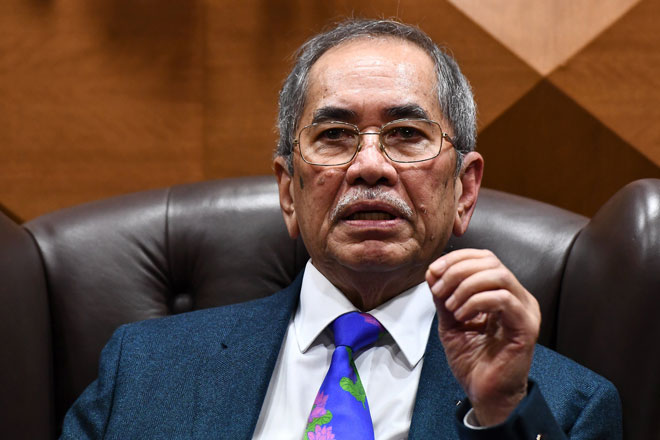LAW Minister Datuk Seri Wan Junaidi Tuanku Jaafar must be a pathetic law minister. A person who should be upholding the highest standards of law with the required enforcement seems to be coming out with a mind-boggling defence of Malaysian Anti-Corruption Commission (MACC) chief commissioner Tan Sri Azam Baki.
He said that it was nothing wrong for civil servants to engage in shares trading in public listed companies but not in futures trading. Given this, it was not wrong on the part of Azam to have bought the shares at the value of 30 to 33 cents per unit in 2016.
Since the value of the shares were low, one million shares would have cost around RM300,000 or slightly more. Such price could have been affordable to some civil servants.
In other words, it was nothing wrong by way of law for Azam to have acquired the shares.
I am afraid to say that Wan Junaidi is not the kind of law minister we want in the country. His argument supporting civil servants delving in the shares market seems to cleverly contrived to save the skin of the embattled Azam.
The issue here is, it is not about civil servants acquiring shares or trading in the shares market but it about the integrity of the civil servants—whether they are allowed to engage in such activities when they should be focussed on their jobs.
The very fact that a number of civil servants engage in shares trading, even if such practices are permissible under the law but may defy the public service orders or directives.
In this respect, it is important for Wan Junaidi to interpret the law by reading together with general orders stipulated by the Public Service Department.
Coming back to Azam’s case, he not only traded in shares but according to his own testimony, bought shares on behest of his brother. Furthermore, he hid the information from the agency!
Perhaps Wan Junaidi wants to ponder on the question why the need for Azam to buy the shares in 2016 at the behest of his brother. Was his brother in some kind of trouble?
But Wan Junaidi, instead of blindly supporting Azam, should ask why he used his name to buy the shares on behalf of his brother?
Wan Junaidi thinks that RM300,000.00 was something affordable to civil servants in 2016. I beg to differ; it could have been affordable to Wan Junaidi or even Azam or even some others.
Holding top officials to higher standards
However, for the vast majority of the public officials, a sum of RM300,000.00 could not have been affordable. Unless of course, there were different sources of income.
So, did Azam have other sources of income in 2016? Or the money was given by his brother? What was the source of his brother’s income?
Wan Junaidi in making a legal case for public officials to engage in the share market, forgot for the moment that he was dealing with Azam, the top official of Malaysia’s corruption busting agency.
How could Wan Junaidi condone the practice of civil servants dabbling in the shares market of public listed companies? Isn’t it morally and ethically wrong to engage in such practices even if these engagements are legally permissible?
What is important now is for the Government to establish a high-powered investigation panel to look into the allegations.
Let us not focus too much on the investigation by the Security Commission (SC) as its terms of reference would be narrow in scope.
An all-party investigation panel might be the right kind of set up to investigate Azam from all angles, such an establishment could even be the forerunner of royal commission of inquiry at a later point in time.
Corruption and other forms of financial misdeeds are become rife in Government departments and public agencies.
And they have become a terrible curse on the future well-being of the country. – Jan 9, 2022.
Ramasamy Palanisamy is the state assemblyperson for Perai. He is also deputy chief minister II of Penang.
The views expressed are solely of the author and do not necessarily reflect those of Focus Malaysia.
Photo credit: The Borneo Post









